Mexican Immigration to the United States Continuities and Changes
Latinos broadly agree that the U.S. immigration system needs an overhaul, with large shares saying it requires major changes (53%) or needs to be completely rebuilt (29%). Only 17% say the immigration system needs no or only minor changes, according to a new national Pew Research Center survey of Hispanic adults conducted in March.
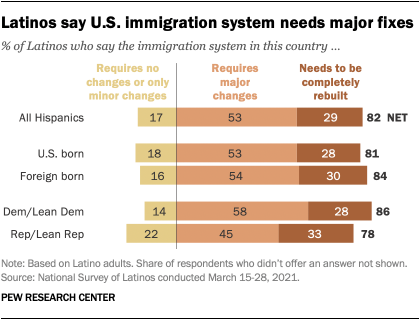
A majority of Latino immigrants and those born in the U.S. share the view that the country's immigration system needs fixing, and this sentiment extends across all ages and education levels. Latinos' views on a variety of issues often break clearly along party lines, but Democrats and Republicans generally agree on the need for substantial changes to the immigration system. At least three-quarters of Latinos in both political parties say the immigration system needs major changes or a total rebuild, though Democrats and Republicans prioritize different immigration policy goals.
For this analysis we surveyed 3,375 U.S. Hispanic adults in March 2021. This includes 1,900 Hispanic adults on Pew Research Center's American Trends Panel (ATP), and 1,475 Hispanic adults on Ipsos' KnowledgePanel. Respondents on both panels are recruited through national, random sampling of residential addresses.
Recruiting panelists by phone or mail ensures that nearly all U.S. adults have a chance of selection. This gives us confidence that any sample can represent the whole population (see our Methods 101 explainer on random sampling), or in this case the whole U.S. Hispanic population.
To further ensure that this survey reflects a balanced cross-section of the nation's Hispanic adults, the data is weighted to match the U.S. Hispanic adult population by age, gender, education, nativity, Hispanic origin group and other categories. Read more about the ATP's methodology. Here are the questions used for our survey of Hispanic adults, along with responses, and its methodology.
President Joe Biden has already taken executive actions to make some changes to the U.S. immigration system during his first three months in office. He took steps to allow unauthorized immigrants who arrived in the U.S. as children to stay in the country legally and stopped construction of a wall at the U.S.-Mexico border. Biden has also proposed legislation that would make it easier for prospective immigrants to come to the U.S. legally and increase spending on technology to secure the border. It remains to be seen whether Congress will take up a comprehensive immigration bill or pursue more targeted legislation that affects only certain parts of the country's immigration system.
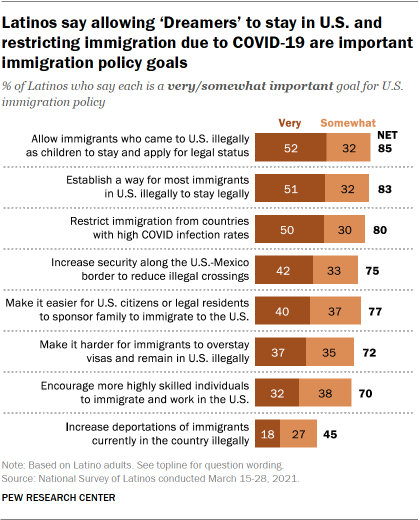
On immigration policy, the survey shows Latinos place a high priority on allowing unauthorized immigrants to stay in the country legally. About half (52%) say it is a very important goal for U.S. immigration policy to allow immigrants who came to the U.S. illegally as children – a group sometimes referred to as "Dreamers" – to apply for legal status, with views little changed from December 2019. About half say the same about establishing a way for most immigrants currently in the country illegally to stay as legal residents (51%) and restricting immigration from countries with high coronavirus infection rates (50%).
Fewer than half of Latinos say it is a very important immigration policy goal to make it easier for U.S. citizens or legal residents to sponsor a family member to immigrate to the U.S. (40%), do more to prevent immigrants from overstaying their visas (37%) and encourage more highly skilled individuals to immigrate and work in the U.S. (32%).
Amid a growing number of apprehensions at the U.S.-Mexico border that have reached levels last seen in 2006, 42% of Latinos say increasing border security is a very important immigration policy goal, while only 18% say increasing deportations is a very important goal.
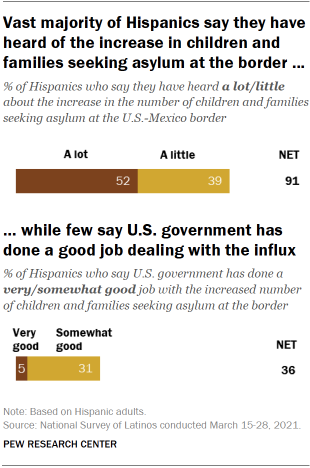
The vast majority of Hispanics in the U.S. say they have heard a lot (52%) or a little (39%) about the increase in children and families seeking asylum at the U.S.-Mexico border. However, relatively few Hispanics say the U.S. government has done a very good (5%) or somewhat good job (31%) of dealing with the influx.
A similar share of Hispanics (44%) and U.S. adults overall (48%) say illegal immigration is a very big problem in the country today, an increase of more than 15 percentage points among both groups since June 2020, according to a new April survey of the general public.
Views on immigration policy among Hispanics, many of whom are immigrants themselves or have at least one immigrant parent, differ in some ways from views among the general public. In 2019, only a third of U.S. adults (33%) said establishing a path to legal status for immigrants in the country illegally was a very important immigration policy goal.
Immigration policy priorities differ among Latino immigrants according to legal status
More immigrants than the U.S. born among Latinos say it is a very important policy goal to allow immigrants who came to the U.S. illegally as children to apply for legal status, and the same is true for allowing most undocumented immigrants to stay in the country legally. However, views vary among Latino immigrants by their legal status. Wide majorities of Latino immigrants who say they are not U.S. citizens and do not have a green card say each of these policies is very important, 73% and 87%, respectively. By contrast, smaller shares of immigrants who are naturalized U.S. citizens (50% and 46%) and those born in the U.S. (49% and 43%) say these polices are very important goals.
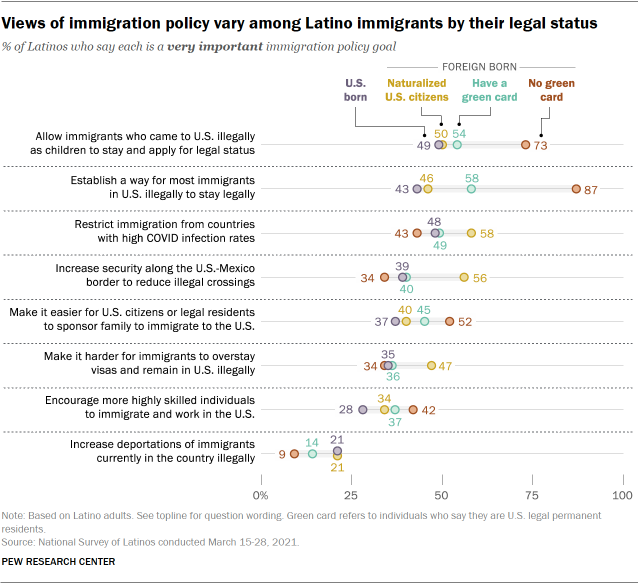
A relatively high share of Latino immigrants who are naturalized citizens prioritize policies that restrict illegal immigration, even when compared with Latinos born in the U.S. More naturalized citizens than those born in the U.S. say it is a very important immigration policy goal to increase security along the U.S.-Mexico border (56% among naturalized vs. 39% for U.S. born) and establish stricter policies to prevent people from overstaying their visas (47% vs. 35%). A similar pattern is seen in views on restricting immigration from countries with high COVID-19 infection rates (58% vs. 48%).
Compared with naturalized citizens, lower shares of Latino immigrants who are not U.S. citizens – with or without a green card – say each of these policies is a very important goal.
Immigration policy priorities among Latinos differ by party
U.S. immigration policy goals for Latinos also vary by party affiliation on seven of the eight immigration policy issues asked about in the survey. Latinos who identify as Democrats or lean toward the Democratic Party are more likely than those who identify or lean Republican to say it is a very important goal to allow immigrants who came to the U.S. illegally as children to stay in the country and apply for legal status (61% vs. 36%). A similar split is seen in the share who say it is very important to establish a way for most immigrants in the country illegally to stay in the country legally (59% vs. 33%).
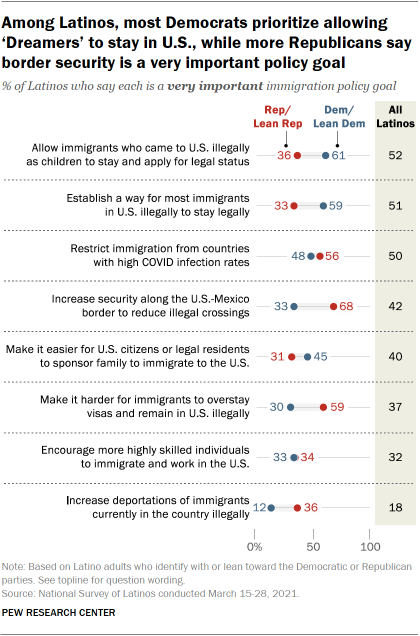
By contrast, about two-thirds of Hispanic Republicans (68%) say increasing security along the U.S.-Mexico border is a very important, compared with only a third (33%) of Hispanic Democrats. A majority of Hispanic Republicans say it is a very important goal to prevent people from overstaying their visas (59%), compared with only 30% of Hispanic Democrats.
Democrats and Republicans among Latinos have more similar views on restricting immigration from countries with high COVID-19 infection rates, 48% vs. 56%. Similar shares of Latino Democrats (33%) and Latino Republicans (34%) prioritize encouraging more highly skilled immigrants to work in the U.S.
Note: Here are the questions used for this report, along with responses, and its methodology.

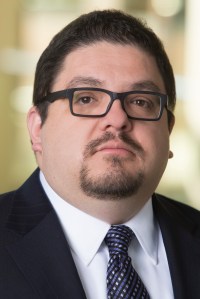
Mark Hugo Lopez is director of race and ethnicity research at Pew Research Center.
Source: https://www.pewresearch.org/fact-tank/2021/04/20/most-latinos-say-u-s-immigration-system-needs-big-changes/
0 Response to "Mexican Immigration to the United States Continuities and Changes"
Post a Comment